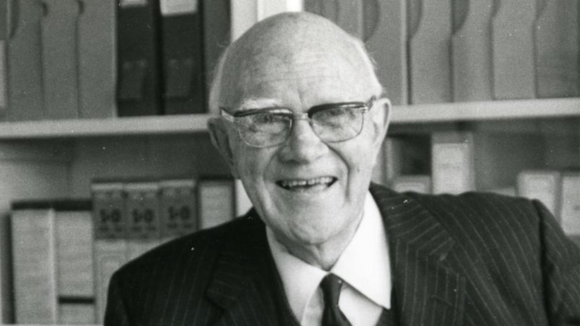
This month has seen the Researching FEPOW History Conference at LSTM; an arena for those interested in researching and remembering those servicemen held in captivity across Southeast Asia and the Far East during World War II. So, to tie in with the conference, today’s Throwback Thursday looks at a member of LSTM staff who did so much to help the men who returned from their period of captivity with both physical and mental wounds – Professor Brian Maegraith.
If you’ve read any of our other articles on the Far East Prisoners of War (FEPOW) project or the Captive Memories website you will know that more than 50,000 British servicemen were captured by Japanese soldiers during World War II and imprisoned in appalling conditions for years. Following the defeat of Japan in August 1945, about 20,000 former prisoners of war arrived back in Liverpool from south-east Asia. They and other FEPOWs brought with them a wide range of diseases that family doctors here had never seen before; worm infections, dysentery, nutritional deficiencies, some of which resulted in nerve damage etc. Many were also profoundly traumatised by their experiences.
Even before the men returned to the UK, LSTM’s then Dean, Professor Brian Maegraith, had realised that the men would be carrying tropical infections, and that LSTM was well placed to help them. In September 1945, he went to Blackpool and spoke to a large group of the men’s families about the kind of tropical diseases and infections that they might return with, answering their questions and even warning of the potential psychological effects of their ordeal. This marked the beginning of a unique scientific and medical collaboration, now in its seventh decade.
Collaboration & friendship
Professor Maegraith was a pivotal figure in LSTM’s early FEPOW work, but the efforts of Brigadier (later Sir) Phillip Toosey warrant similar recognition. He was a survivor of captivity in various camps in Thailand where his leadership, organisational skills, and care for the men in his charge undoubtedly saved many lives. That duty of care carried over into civilian life when on his return to the UK he was contacted by local men who had served with him and who were enduring physical, psychological, and financial problems as a result of their captivity. Brigadier Toosey facilitated one man’s referral to LSTM where he was successfully treated, and soon after met with Professor Maegraith to ask for further help. Maegraith willingly agreed and accepted other sick FEPOWs for tropical disease investigation and treatment, marking the beginning of a long-term collaboration and friendship. Indeed, Toosey later became President of LSTM.
From 1968 onwards LSTM was the primary national centre for Tropical Disease Investigations (TDIs) for FEPOWs, and treated thousands of men, many of whom suffered relapses of diseases contracted overseas.